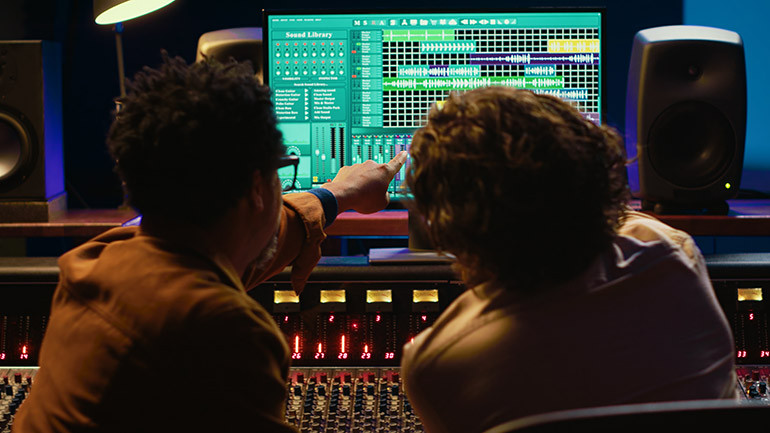The Pros & Cons of Co-Producing
Much like co-songwriting, sharing production duties with a collaborator can open your music to new ideas for recording and arranging—or it can just lead to a lot of tension that could’ve been avoided had you gone solo. Here are some thoughts on what to look for when considering a production partner

During those early hunker-down days of the pandemic, many musicians sought to alleviate the solitude by working remotely on recording projects with peers outfitted with the right gear. Even with life returning to something resembling normalcy, many of us continue to maintain these virtual relationships, looping in a trusted source not just for exchanging song ideas, but sharing recording and production duties as well.
Like any partnership, enlisting a co-producer/engineer can potentially reveal ideas you may not have considered otherwise—or it may result in a lot of stress that could’ve been easily avoided had you just stuck with your regular routine. Before you take the plunge, here are some things to look out for when working with a control-room co-conspirator.
What makes a “co-producer”? First, what kinds of services does one perform in order to receive co-production credit? Much depends on your definition of the admittedly fuzzy term “producer,” but generally speaking it could be someone who suggests structural song changes or embellishments, provides alternate mixes and other technical advice, or both. If your production assistant happens to be proficient on multiple instruments and can also add vocal harmonies in a pinch, all the better. As head of operations, you get to decide how much third-party involvement you’d like right from the start. If you’re unsure how the relationship will pan out, you could start small, such as asking for help with arrangement ideas, making rough mixes and other basic tasks.
Production compatibility. In a recent column, we discussed how to go about retaining a studio for hire, including whether a room passes muster from both a technical and aesthetic perspective. Choosing a production partner involves many of the same considerations, including, first and foremost, whether your own production values align with those of the prospective colleague. The first step is easy: as you would when scouting out a recording facility, listen to a sampling of projects the producer has worked on to see if you like the overall approach. Don’t necessarily rule out someone right off the bat if their drum sound is markedly different from yours—under the right circumstances, a good production foil might help you learn new techniques and break out of old habits.
Compare hardware. Though you’ll likely be doing a lot of the work on a remote basis, it’s helpful to know how your partner’s recording inventory stacks up to yours, including type of format/operating system used, sound processing and mastering tools available, and so on. For the most part, shuttling back and forth is simply a matter of exchanging .wav files, no matter their point of origin; still, if there are any cross-platform or other compatibility issues, better to cross that bridge before you get going. On the other hand, if you tend to avoid spending a lot of money on plugins and the like, partnering with someone who has invested heavily in that sort of gear could certainly work to your advantage.
Mixed results. As we all know, putting together a final mix can be a very subjective process—you may like to hear more high end and/or bottom throughout, or perhaps you prefer guitars or keyboards to be panned a certain way, and so on. But if your production teammate is more moderate with equalization, or likes to heavily process drums or voices, a standoff can easily occur unless you’re both willing to make accommodations. To avoid conflict, try making several mixes separately, then listen to each other’s work and subsequently put together an edited master that incorporates elements of both.






Community
Connect with BMI & Professional Songwriters